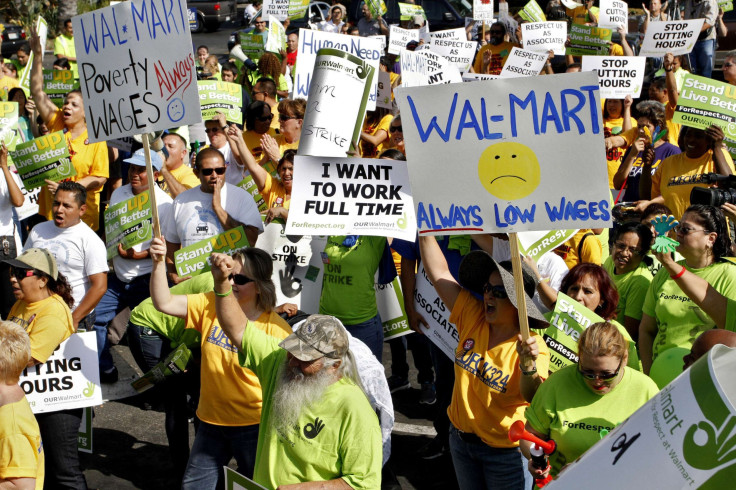Black Friday Protests Underscore Long Rivalry Between Wal-Mart And UFCW Union

Wal-Mart Stores Inc. (NYSE: WMT) is facing off this holiday against a traditional foe, the United Food and Commercial Workers (UFCW) union, even if the planned nationwide Black Friday demonstrations are being organized by non-unionized workers of the world’s largest retailer.
In an unusual move, the company went to the same organization the UFCW has used over the years to fight what it considers a hostile and unconstitutional stance against workers’ rights to free speech and association: the National Labor Relations Board (NRLB). On Monday, Bentonville, Ark.-based Wal-Mart asked the NLRB to block what the company calls illegal union picketing, but the NLRB Office of General Counsel has said a decision before the Thanksgiving holiday is unlikely.
"The legal issues -- including questions about what constitutes picketing and whether the activity was aimed at gaining recognition for the union -- are complex," the agency said in a written statement. "Also, there are many distinct factual circumstances at stores across the country to consider."
The latest labor unrest among some Wal-Mart employees is underscored by a long-simmering rivalry between the company and the country’s 1.3-million-member union representing grocery store and retail employees. The UFCW claims Wal-Mart’s expansion strategy has elbowed out many smaller grocery store chains, leaving workers little choice but to put on the signature blue Wal-Mart vest.
Since October a group called Organization United for Respect at Walmart, or OUR Walmart, has been working to organize protests at outlets nationwide ever since the company announced it was opening its Black Friday sales event – an annual ritual among U.S. consumers that typically begins the evening of Thanksgiving.
The group claims that, among other issues, Wal-Mart managers implement irregular and unpredictable schedules (a process known as “optimized scheduling”) that make income unpredictable from one pay period to the next; that employees are prevented from gaining the hours necessary to qualify for the company’s health plan; and that the wages are so low many workers are forced to rely on government assistance typically associated with the unemployed. The group claims “most” Wal-Mart employees earn less than $10 an hour; the company contends that the average full time hourly rate is between $12 and $13 an hour.
For its part, Wal-Mart says the protests are planned by a sliver of the 1.3 million workers it employs. It also says that the UFCW is exploiting a media bias.
“OurWalmart, the name of the group making claims about the Black Friday activity, is a wholly owned subsidiary of the UFCW. The reality is that there are only a handful of associates, at a handful of stores scattered across the country that are participating in these made for TV events,” said a lengthy statement from the company, which can be read in its entirety here. Wal-Mart says it has 250,000 workers who have spent more than 10 years with the company and that it has a turnover rate that is lower than the total retail sector, which includes small and micro-sized businesses, such as small grocers and shopping mall kiosks.
A quick search for decisions at the National Labor Relations Board (NRLB) online database turns up pages of cases involving the UFCW and Wal-Mart, many involving the union complaining that employees were singled out for reprisals for spreading the union gospel in the workplace.
For example, an outlet in Henderson, Nev., was forced in 2007 to agree to stop telling employees to disregard or destroy union literature or take away such literature from employees. The cease and desist order stemmed from an incident where Wal-Mart produce sales clerk Larry Allen was discharged after promoting unions and distributing union literature.
Black Friday Show Must Go On
Regardless of the protests, Wal-Mart’s Black Friday plans remain. It will kick off the special sales campaign two hours earlier than last year, at 8 p.m. EST on Thanksgiving night. For the first time it will offer the same deals through its website that it is promoting in-store, a move to elevate the company’s online sales as it and other retailers struggle with changing U.S. consumer buying habits that have wholly embraced e-commerce.
Fourth-quarter sales activity is critical to big retailers, which is the largest U.S. employer and one of the few channels for lower skilled, lesser educated, younger or older workers in an America that has lost much of its traditional manufacturing jobs to globalization. Wal-Mart says 28 percent of its $443 billion dollars in annual sales comes from the last quarter of the year, which includes the U.S. holiday shopping season.
© Copyright IBTimes 2024. All rights reserved.






















